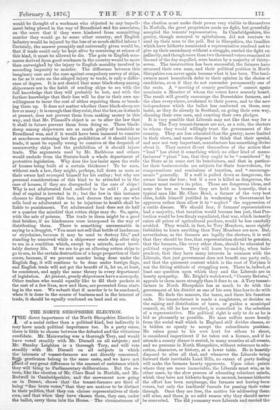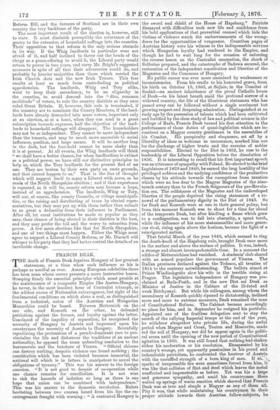THE NORTH SHROPSHIRE ELECTION.
THE direct importance of the North Shropshire Election is of a social rather than a political kind, but indirectly it may have much political importance too. In a party sense, there is little to choose between the defeated and the victorious candidate. Mr. Mainwaring was a thorough Tory, and would have voted steadily with Mr. Disraeli on all subjects ; and Mr. Stanley Leighton is a thorough Tory, and will vote steadily with Mr. Disraeli on all subjects in which the interests of tenant-farmers are not directly concerned. Bt-ii gentlemen belong to the same caste, and we have not Vn,rd of any great difference in the amount of assistance which they will bring to Parliamentary deliberations. But the re- turn, like the election of Mr. Clare Read in Norfolk, and Mr. Rodwell in Carctbridgeshire, and the movement now going on in Dorset, shows that the tenant-farmers are tired of being "fine brute votes," that they are anxious to be distinct in their politics, that they can choose representatives of their own, and that when they have chosen them, they can, under the ballot, carry them into the House. The circumstances of
the election must make their power very visible to themselves In Norfolk, the great proprietors made no fight, but gracefully accepted the tenants' representative. In Cambridgeshire, the gentry, though annoyed to spitefulness, did not venture to send up their man to the poll. But in Shropshire, the families which have hitherto nominated a representative resolved not to give up their ascendancy without a struggle, carried the fight on gallantly, and though more than two thousandvoters remained at the end of the day unpolled, were beaten by a majority of thirty- seven. The insurrection has been successful, the farmers have returned their own man, and their political position in North Shropshire can never again become what it has been. The land- owners must henceforth defer to their opinion in the choice of candidates, even if they do not surrender permanently one of the seats. A "meeting of county gentlemen" cannot again nominate a Member of whom the voters have scarcely heard. The result will greatly encourage the Dorsetshire farmers, and the class everywhere, awakened to their power, and to the new independence which the ballot has conferred on them, may insist, as they do already in Scotland, on going their own way, choosing their own men, and exacting their own pledges.
It is very possible that Liberals may not like that way for a time. The Tory tenant-farmers are not, as a rule, the electors to whom they would willingly trust the government of the country. They are less educated than the gentry, more limited in their views, and more disposed to think that their special, and now not very important, manufacture has something divine about it. They cannot divest themselves of the notion that " land " has about it something which no other kind of manu- facturers' 4plant " has, that they ought to be " considered " by the State as in some sort its benefactors, and that in particu- lar their business-risks are subjects for State benevolence, for compensations and remissions of taxation, and " encourage- ments " generally. If a wall is pulled down as dangerous, the owner bears the loss ; but if a cow is killed as dangerous, the farmer must receive its price. Those are dangerous ideas, and none the less so because they are held so honestly, that a typical man like Mr. Clare Read, a farmer of the very best class, holds himself justified in weakening a Government he approves rather than allow it to " neglect " the suppression of a cattle disease. We should fear, if farmers' representatives had a majority, that taxation would become less just, that Pro- tection would be less firmly repudiated, that war, which instantly raises all prices of agricultural produce, would be less carefully avoided. They would, in fact, be Tory Members, more rigidly forbidden to learn anything than Tory Members are now. But, nevertheless, as the farmers are legally the electors, it is well that they should be free, that representation should be genuine, that the farmers, like every other class, should be educated by political experience. They will learn by-and-by, when inde- pendent, that they have many interests in common with the Liberals, that just government does not benefit one party only, and that the quiescent content which is the root of Toryism is nol the fitting attitude of straggling men. There is, indeed, at least one question upon which they and the Liberals are in hearty sympathy. Mr. Bright's watchword, "County Reform,' appeals to them more strongly than it does to us. A Tory tenant- farmer in North Shropshire has as much to do with the government of his district as one of his own kine has to do with corn. He finds the manure, the taxes, and there his function ends. No tenant-farmer is made a magistrate, or decides on the raising and distribution of taxes, or guides a municipal council, or, till he has revolted, is consulted in the selection of a representative. His political right is only to do as he is bid as pleasantly as possible. No man suffers more keenly from the social wall which in England still divides classes, or is bidden so openly to accept the subordinate position. He raises game to his own hurt for others to shoot, is considered impertinent if he takes out a licence, and if he attends a county dinner is seated, in many counties at all events, and we presume in North Shropshire, without reference to edu- cation, character, or history, at a lower table. He is heartily disposed to alter all that, and whenever the Liberals bring forward their inevitable Land Bills, no extent of party feeling will make the farmers hearty opponents. Upon other points where they are more immovable, the Liberals must win, as in other cases, by the slow process of educating reluctant minds, which they have not hitherto begun in earnest, because hitherto the effort has been surplusage, the farmers not having been voters, but only the landlords' funnels for passing their votes through. Once they are free, the motive for addressing them will arise, and there is no solid reason why they should.never be converted. The old yeomanry were Liberals and carried the
Reform Bill, and the farmers of Scotland are in their own country the very backbone of the party. The most important result of the election is, however, still to state. It must diminish perceptibly the reluctance of the gentry to the extension of household suffrage into the counties.
Their opposition to that reform is the only serious obstacle in its way. If the Whig landlords in particular were not afraid of it, and half inclined to throw out the heads of the clergy as a peace-offering to avoid it, the Liberal party would return to power in two years, and carry Mr. Bright's suggested measures in spite of all that their adversaries could do, and probably by heavier majorities than those which carried the Irish Church Acts and the new Irish Tenure. This fear results at least as much from caste-feeling as political apprehension. The landlords, Whig and Tory alike, want to keep their ascendancy, to be an oligarchy in the counties, to avoid descent into the "dim, common multitude" of voters, to rule the country districts as they once ruled Great Britain. If, however, this rule is terminated, if the tenantry are to nominate the County Members, if the land- lords have already descended into mere voters, important only at an election, as at a hunt, when they can send in a great subscription towards expenses, half the objection of the land- lords to household suffrage will disappear. The householders may not be so independent. They cannot be more independent than the tenants, and may be much more amenable to social influence, position, and large means. It will be another leap in the dark, but the foot-hold cannot be more shaky than it is at present. At all events, the Whig landlords will think "we shall have a better chance, for when landlordism is extinct as a political power, we have still our distinctive principles to help us, which the Tory landlords for the present find of no use. They are beaten by their own party on caste grounds, and that cannot happen to us." That is the line of thought which will suggest itself to many a Liberal with acres, as he reads of the North Shropshire election ; and if that experience is repeated, as it will be, county reform may become a hope, instead of an apprehension. The landlords, Whig or Tory, will not, of course, like county Councils, or village municipali- ties, or the raising and distributing of taxes by elected repre- sentatives, but they may put up with them rather than submit to so great a deduction from their influence in Parliament. After all, let rural institutions be made as popular as they may, their chance of being elected in their districts is the best, and they may prefer the toil and the worry to ostracism from power. A few more elections like that for North Shropshire, and one of two things must happen. Either the Whigs must agree to support a Liberal County Reform, or Mr. Disraeli will whisper to his party that they had better control the details of an inevitable change.



































 Previous page
Previous page